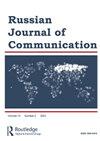The migration crisis in Europe: a case study of framing by RT and First Channel
Q1 Social Sciences
引用次数: 1
Abstract
ABSTRACT This article compares the output and functions of Russian national and international television broadcasts through a case study of this media coverage of the European Union and the migration crisis in European countries. The channels chosen for the study are RT, which has projected Russia's view of the world internationally, and the First Channel (FC) which is the most widely available TV channel inside Russia. The data examined confirms that the messages and frames presented by Russian television use various techniques to influence their audiences and are modified for internal and external audiences. However, in common they portray European authorities as incompetent and unable to maintain order in the context of the migration crisis. It is argued in the article that the main function of this portrayal of disorder in Europe is to facilitate the consolidation of the Russian state's domestic control and power.欧洲的移民危机:RT和第一频道的框架案例研究
本文通过对俄罗斯国内和国际电视广播报道欧盟和欧洲国家移民危机的案例研究,比较了俄罗斯国内和国际电视广播的输出和功能。该研究选择的频道是RT,它在国际上展示了俄罗斯对世界的看法,以及第一频道(FC),这是俄罗斯国内最广泛使用的电视频道。经审查的数据证实,俄罗斯电视所呈现的信息和框架使用各种技术来影响其观众,并针对内部和外部观众进行了修改。然而,它们都把欧洲当局描绘成无能的、无法在移民危机背景下维持秩序的人。本文认为,这种对欧洲混乱的描述的主要功能是促进俄罗斯国家对国内的控制和权力的巩固。
本文章由计算机程序翻译,如有差异,请以英文原文为准。
求助全文
约1分钟内获得全文
求助全文
来源期刊

Russian Journal of Communication
Social Sciences-Political Science and International Relations
自引率
0.00%
发文量
0
期刊介绍:
Russian Journal of Communication (RJC) is an international peer-reviewed academic publication devoted to studies of communication in, with, and about Russia and Russian-speaking communities around the world. RJC welcomes both humanistic and social scientific scholarly approaches to communication, which is broadly construed to include mediated information as well as face-to-face interactions. RJC seeks papers and book reviews on topics including philosophy of communication, traditional and new media, film, literature, rhetoric, journalism, information-communication technologies, cultural practices, organizational and group dynamics, interpersonal communication, communication in instructional contexts, advertising, public relations, political campaigns, legal proceedings, environmental and health matters, and communication policy.
 求助内容:
求助内容: 应助结果提醒方式:
应助结果提醒方式:


